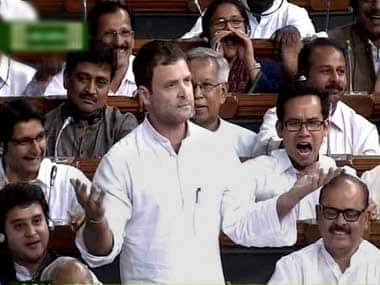Listening to Rahul Gandhi can be nerve-wrecking for his fans. So prone is he to blunders, gaffes and irrelevant anecdotes that every time he starts speaking his followers start praying for his speech to finish without him making a howler or a laughable quote that can be added to India’s political discourse. [caption id=“attachment_2204732” align=“alignleft” width=“380”]  Rahul knew he had a winner with the suit boot sarkar jibe: PTI[/caption] On Monday, Rahul fans got more than they could have prayed for. Not only did he manage to put together a speech free of verbal malfunction, but he also contributed his first memorable phrase to India’s political lexicon: ‘suit, boot ki sarkar.’ By Rahul’s standards this is a huge victory - a giant leap of speech. Nobody understands the importance of a catchy line better than Rahul. In the 2014 campaign, the BJP and its followers dismantled both Rahul and the Congress with pithy, cruel one-liners and words. Maa-bete ki sarkar, Shehzaade, Pappu and similar epithets destroyed Rahul’s campaign before it ever had a chance to peak. The smirk of satisfaction on Rahul’s face after his intervention in Parliament suggests that finally the Congress also has a line of its own to emblazon on politics. Do not underestimate the power of Rahul’s new jumla. It is a fitting punchline to a concentrated campaign that the Congress has been trying to build up against Modi. The Congress has realised it doesn’t stand much of a chance with the urban middle class and elite. It knows its existing culture of dynasty-based entitlements and politics of doles and freebies is largely unacceptable to this section. But the Congress believes the Narendra Modi government has given it an opening by acquiring the reputation of being pro-corporate and anti-poor. Modi’s monogrammed suit, the controversy over the land acquisition bill and his frequent foreign jaunts have convinced the Congress that it can revive itself by restarting the debate around haves and have-nots and making the PM seem like a representative of the rich and the privileged. To be fair to Rahul, he has been consistent in his focus on the underprivileged. The dynast with little experience of poverty, life in rural India and the travails of the daily- wage earner has, ironically, been more comfortable fighting for the rights of the underprivileged. During the UPA raj, the Congress had straddled both worlds when it tried to balance the pro-poor image of the Gandhis with the pro-liberalization and free-market economics of Manmohan Singh. But, Arvind Kejriwal’s victory in Delhi seems to have convinced Rahul that there is indeed a future for the politics of garibi and populism. In politics, it is considered a psychological victory if the opponent changes his strategy because of your moves. A battle plan is considered effective if the rival takes up a defensive position to counter the impact. By that yardstick, the Congress seems headed in the right direction. Just before Rahul’s speech at the Ramleela Maidan on Sunday, Modi also tried to rebrand himself as a messiah of the poor. Pilloried by his rivals for being pro-rich and anti-farmer, Modi spent an hour explaining that his government has been working consistently to address the concerns of the poor and marginalised sections of society. The speech, just an internal party dialogue, was televised live, underlining the importance of Modi’s pre-emptive measure and the realization that the Congress may have found an issue that needed to be countered. When he won a decisive mandate after railing against Sonianomics, criticizing government doles and populist schemes like MNREGA, it was assumed that the narrative would shift to industries, corporates, urban development and the middle class—subjects he had raised during the campaign. But his efforts to repackage himself as pro-poor show that he believes there is another section of Indian populace that needs his attention since it is more vulnerable to opposition politics. Modi’s 2014 election campaign is already history. Promises of bullet trains, and smart cities, slogans about black money and Swiss bank accounts are all passé. Dreams and aspirations of the middle class and urban India are out of the political discourse. Poor are in. There is no guarantee, though, that Rahul will succeed. Elections are still four years away and Modi has the chance to snare the Congress quarry back into his net with the force of his personality and the might of his government. The land acquisition controversy has erupted too early in the life of Modi sarkar. Modi has plenty of time and wherewithal to counter the ‘suit, boot’ slur and reboot his government. Rahul, on the other hand, will have to be consistent; both in his attack on Modi and his ability to deliver speeches that evoke applause, not derision.
Do not underestimate the power of Rahul’s new jumla. It is a fitting punchline to a concentrated campaign that the Congress has been trying to build up against Modi.
Advertisement
End of Article


)
)
)
)
)
)
)
)
)



